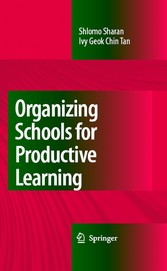
Organizing Schools for Productive Learning

von: Shlomo Sharan, Ivy Geok Chin Tan
Springer-Verlag, 2008
ISBN: 9781402083952
Sprache: Englisch
117 Seiten, Download: 545 KB
Format: PDF, auch als Online-Lesen
| Contents | 6 | ||
| About the Authors | 9 | ||
| List of Tables | 10 | ||
| List of Figure | 11 | ||
| The Purpose of This Book | 12 | ||
| Introduction | 14 | ||
| Students Are Bored in School | 15 | ||
| Why the Boredom? | 16 | ||
| The Road to Productive Learning in School | 17 | ||
| Two Models of School Structure | 20 | ||
| Structural Change: Necessary but Not Sufficient | 20 | ||
| Organizational Regularities in School The One- by- One Formula | 21 | ||
| The “One-by-One” Formula and the Hierarchical Nature of Bureaucracy | 22 | ||
| A Hard-Nosed View of the One-by-One Concept | 24 | ||
| The Greater-Than-One Formula | 25 | ||
| A Policy of Instructional Coherence | 26 | ||
| The Discipline-Oriented Organization of Schools | 30 | ||
| Human Organization Is Contrived | 33 | ||
| What Structure Cannot Do for Teachers | 35 | ||
| School Organization and Teaching Practices: A Summary of Our Goals | 37 | ||
| The School as a Community | 38 | ||
| Part 1: The School as a Community | 38 | ||
| School Organization and Community | 39 | ||
| Communities and Other Enterprises | 41 | ||
| The Goals of the School as a Community | 43 | ||
| Community and Academic Disciplines | 45 | ||
| Qualities of Leadership | 46 | ||
| Part 2: The School in the Community | 47 | ||
| The Community as a Site for Learning | 47 | ||
| Student Engagement in Learning | 52 | ||
| A Cognitive-Affective Concept | 52 | ||
| Engagement and the Learning Environment | 53 | ||
| Engagement and Students’ Conceptions of Learning | 54 | ||
| Meaning and Student Autonomy | 55 | ||
| Class Size and School Size | 57 | ||
| What Is a Large Class? | 57 | ||
| Teaching Methods Omitted from Studies of Class Size | 59 | ||
| Does Class Size Inhibit Innovation? | 62 | ||
| School Size | 63 | ||
| The Integrated Curriculum | 66 | ||
| The Fusion of Academic Disciplines | 66 | ||
| The Problem of Relevance | 67 | ||
| The Problem of Integration | 70 | ||
| Duration of Class Sessions and the Problem of Teaching Method | 75 | ||
| The Anticipated Demise of the 50-Minute Hour | 76 | ||
| Alternative Teaching Methods and the 50-Minute Hour | 77 | ||
| More Alternative Schedules | 78 | ||
| Extensive and Intensive Study Projects | 79 | ||
| How Schedule Reform Affects Teaching: Some Research | 80 | ||
| Teachers’ Evaluations | 81 | ||
| Results Regarding Students | 82 | ||
| Some Conclusions | 83 | ||
| Student Assessment | 84 | ||
| Assessment as Testing | 84 | ||
| Alternative Assessment | 85 | ||
| Summative and Formative Assessment | 87 | ||
| More Alternative Approaches to Assessment | 89 | ||
| A Systems Approach to Organization and Instruction in Schools | 92 | ||
| Systems Integrate, Bureaucracies Separate | 92 | ||
| A System Is Not a Collection | 93 | ||
| Classrooms as Social Systems | 95 | ||
| Can Schools Adopt New Principles of Organization? | 97 | ||
| References | 98 | ||
| Author Index | 104 | ||
| Subject Index | 107 |







